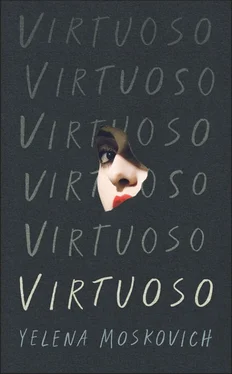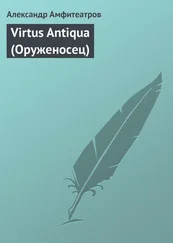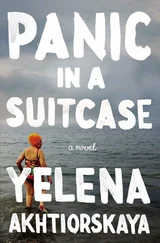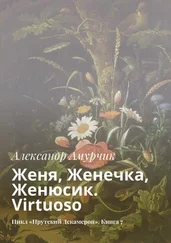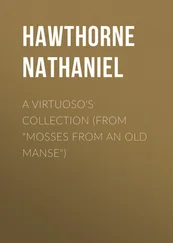Yelena Moskovich - Virtuoso
Здесь есть возможность читать онлайн «Yelena Moskovich - Virtuoso» весь текст электронной книги совершенно бесплатно (целиком полную версию без сокращений). В некоторых случаях можно слушать аудио, скачать через торрент в формате fb2 и присутствует краткое содержание. Город: London, Год выпуска: 2019, ISBN: 2019, Издательство: Serpent's Tail, Жанр: Современная проза, на английском языке. Описание произведения, (предисловие) а так же отзывы посетителей доступны на портале библиотеки ЛибКат.
- Название:Virtuoso
- Автор:
- Издательство:Serpent's Tail
- Жанр:
- Год:2019
- Город:London
- ISBN:978-1-7881-6025-4
- Рейтинг книги:3 / 5. Голосов: 1
-
Избранное:Добавить в избранное
- Отзывы:
-
Ваша оценка:
- 60
- 1
- 2
- 3
- 4
- 5
Virtuoso: краткое содержание, описание и аннотация
Предлагаем к чтению аннотацию, описание, краткое содержание или предисловие (зависит от того, что написал сам автор книги «Virtuoso»). Если вы не нашли необходимую информацию о книге — напишите в комментариях, мы постараемся отыскать её.
Virtuoso — читать онлайн бесплатно полную книгу (весь текст) целиком
Ниже представлен текст книги, разбитый по страницам. Система сохранения места последней прочитанной страницы, позволяет с удобством читать онлайн бесплатно книгу «Virtuoso», без необходимости каждый раз заново искать на чём Вы остановились. Поставьте закладку, и сможете в любой момент перейти на страницу, на которой закончили чтение.
Интервал:
Закладка:
Yelena Moskovich
VIRTUOSO
When I dream it’s of you
My love, my friend
When I sing it’s for you
My love, my friend
…and huge stars,
above the feverish head, and hands,
reaching out to the one,
who hasn’t for ages existed – and won’t exist –
who cannot exist – and must exist.
PART ONE
Soliloquy
Face down on the hotel linen, the body. Just one hand drooping off the side of the bed, resting on the bristles of the rose-coloured carpet, fingers spread, glossy nails, raw cuticles, wedding ring in white gold like an eye frozen mid-wink.
The rest of her is emptied flesh, breasts smothered into the bedsheet, pillows crushed against the headboard. Her contorted shoulders a grimace, the back of the knee a gasp, skin already dimming.
This woman is alone.
Her wife has set the bag of lemons down on the coffee table of the hotel suite. She is approaching the closed bedroom door. Hand on the knob, turning. The metal spring jumps and the door is sliding over the flush carpet fibres.
When her wife sees the body – how alone it is – she pounces on top of it.
Outside, the whirling sound of the ambulance. Closer and closer to the hotel. In the bedroom, on the nightstand, the phone hangs off its tight-curl cord, beeping hysterics. The wife is scavenging the body for breath, hair in her mouth, she’s pulling it out. She’s dragging the body down, thump. Millions of rose-coloured bristles. Her hands clam at the sternum. The phone is beeping and she’s thumping the ribcage, and rubber-soled footsteps are nearing. The hotel clerk is young and lean, he steps forward then back, then forward then back, he wants to look, he doesn’t want to look. A heavier pacing behind him, the manager is here now, he says, “ Volte agora para baixo ” to the kid, Go downstairs now. As the kid is fumbling away, a man and a woman in forest green medical uniforms brush past him. “Go!”, the manager repeats. The kid is going but he keeps looking back. The wife is screaming now: “ Por favor! She’s going to die!”
The defibrillator is unpacked. The man in uniform has a patch on his breast pocket, a medical emblem with a thin red snake. The woman in uniform, same patch, nudges the thumping wife, pulls her aside, pulls her aside again. “I don’t speak Portuguese! We’re on holiday!” The woman in uniform is touching her shoulder and making eye contact. The wife is yelling in French like chewing, and the woman in uniform is holding her back and nodding. The wife is sloshing her blonde hair away from her eyes, trying to gawk back towards the body. Her tongue is fidgeting with words, she’s thinking, I just want to touch her , as if touching the body were all it would take. The woman in uniform is pulling her into the adjacent room. “I understand,” the woman in uniform is repeating in her nasally English, “I understand, Madame…”
“Clear,” the man in uniform pronounces in Portuguese and sends the body a shock, its chest curves up, the wife jumps towards the woman in uniform, the woman in uniform catches the wife, something like a hug, the body falls back down to the carpet. The wife’s tears split like hairs. “Clear,” the man pronounces again, the woman in uniform is squeezing the wife’s forearms. The wife shuts herself up with her own gasp and peers. The current races through the flesh to the heart and pulls the body up, chest bowing, ribs splintering beneath her skin, and for a moment, the wife thinks she’s getting up this time. But the body cinches in and collapses, thump, back down into the millions of rose-coloured bristles. Her shoulder blades hit the floor and spread, and the head winces then stops. The mouth inert. From her slack, parted lips, a viscous blue foam is seeping out.
Later, the sun has set. The wife fills out the forms, empty stare, stiff wrist, runny nose. The body’s name and age and social security number. Her own name she writes haltingly, having to look away and then back down at the paper several times. When her pen finishes the last letter, she picks up the paper and stares at her full name: Aimée de Saint-Pé .
It is then that she feels an extra presence in the room. Something like a colour where there was no colour. She looks around her: the doctor’s a brunette in starched white, sitting in her chair; behind her, light-grey window panes; below, a floor of pale freckled tiles. And yet, there is an extra weight within the room, like a movement finishing itself.
The nurse puts a hand on Aimée’s shoulder. “Are you alright, Madame? Do you need another glass of water maybe?” Aimée looks up at the nurse. Her lips are oily in the crevices, her skin is darker after sunset, and her eyes – Aimée’s stare is gliding past the nurse, behind her head, towards the wall of the office. Something is there.
The nurse is waiting. “Do you need…?” she starts again, but then lets the phrase go. It is behind her, yes. The weight, the movement, the colour.
The doctor looks up and then back down at the paperwork. The nurse is speaking to Aimée again. But it – it is untucking itself from the air, groping its way along, moving towards her like flesh.
A click pinches metal and Aimée’s chair fills with a wet heat. The doctor has stapled the forms, and urine drips onto the floor.
A little to the left, mon amour
It was an ambling humidity, as August exhaled and the ocean knocked itself against the coasts, beating out the fever. In Paris, the cars shuffled back with their passengers after the holidays, and the mugginess hovered at the tops of cars and the chests of pedestrians and the ground-floor windows.
I knew your friend, the Malá Narcis , was how Mr Doubek’s email began.
Jana’s armpits were once again damp, despite the deodorant she had reapplied in the train-station toilets. She was just coming back to Paris from her solo holiday to the South.
She had had the idea to go to Marseille in the first place when she was translating a brochure for import/export petroleum, which mentioned the city was France’s major centre of oil refining, having extensive access to the French waterways up into the Rhône through the canal. She looked at the train prices and found them reasonable.
In Marseille, she took the ferry to the island of If and visited the dungeon from Dumas’ The Count of Monte Cristo ; she ate swordfish with ratatouille and saffron rice; she looked at the Opéra de Marseille from the outside and saw that nothing was on; she sniffed the various local soaps; she eyed the flopped fish on the blue tarp with crushed ice at the fish market on the Quai des Belges at the end of the harbour; and then she went to the beach, took a seat in the shade and tried to imagine how someone like Antonin Artaud, the misfit avant-garde theatre artist and Marseille native, could have grown up here. She pictured him with far-flung eyes, pacing around his home city, philosophically infuriated. As she watched the blot of his silhouette jerk along the sand, she realised it wasn’t him at all that she was envisioning, but a girl she used to know back in Prague, who everyone called the Malá Narcis, the Little Narcissus.
That evening, Jana meandered towards the city centre and the so-called lesbian bars she had spotted, went into one, sipped on a gin and tonic at the bar, and then walked back to the hotel. Five nights of it was enough, she didn’t need seven, so she went to the train station and changed her ticket.
Читать дальшеИнтервал:
Закладка:
Похожие книги на «Virtuoso»
Представляем Вашему вниманию похожие книги на «Virtuoso» списком для выбора. Мы отобрали схожую по названию и смыслу литературу в надежде предоставить читателям больше вариантов отыскать новые, интересные, ещё непрочитанные произведения.
Обсуждение, отзывы о книге «Virtuoso» и просто собственные мнения читателей. Оставьте ваши комментарии, напишите, что Вы думаете о произведении, его смысле или главных героях. Укажите что конкретно понравилось, а что нет, и почему Вы так считаете.
